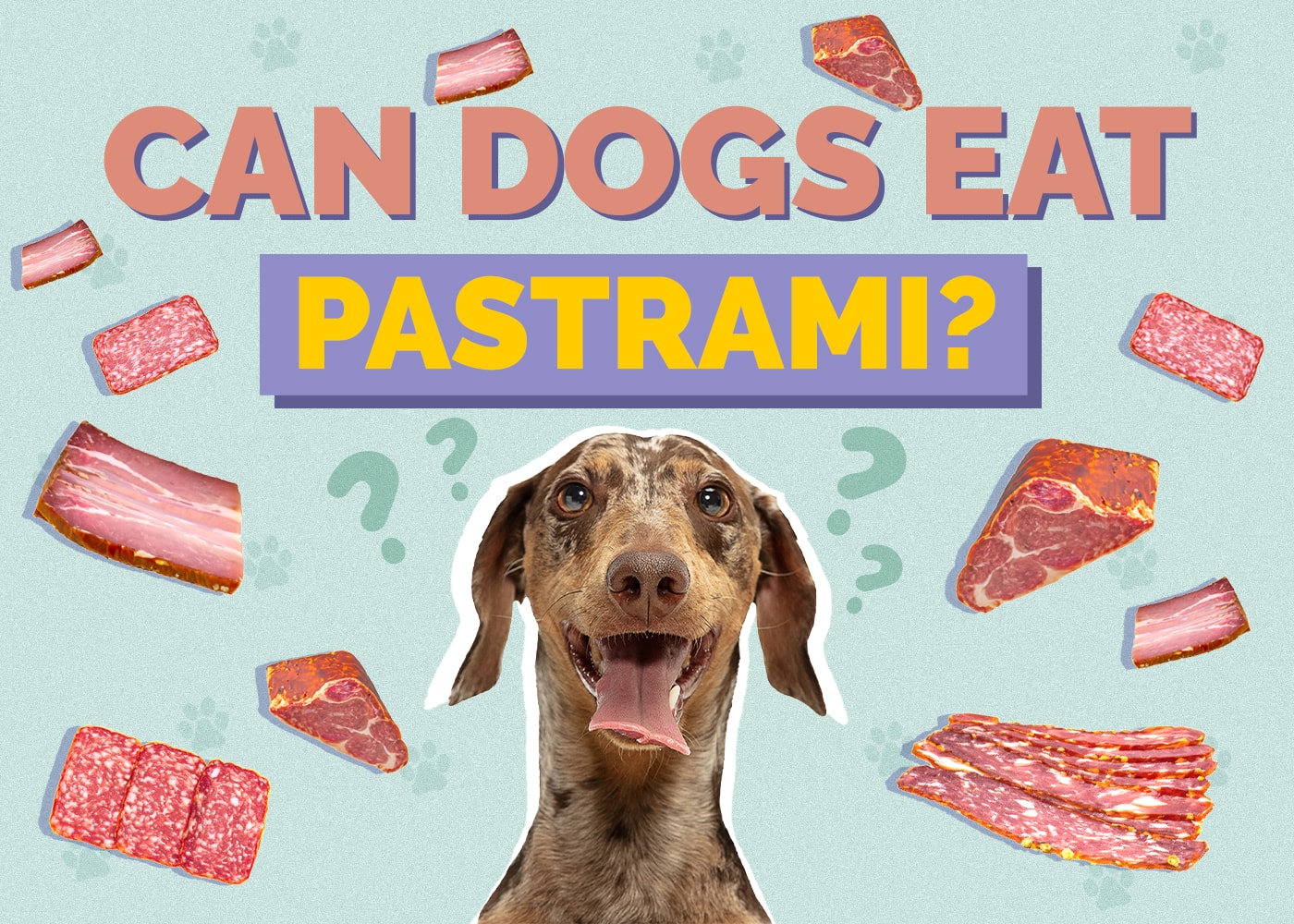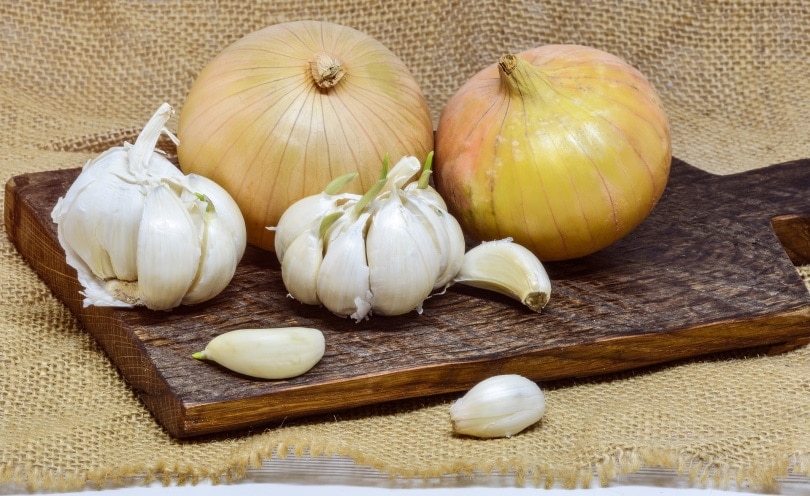Can Dogs Eat Pastrami? How Healthy Is It?

Updated on

Lithuanian immigrant Sussman Volk introduced pastrami to New York City in the late 1800s. The story goes that the recipe was given to Volk by a Romanian friend who owed him a favor. Pastrami, according to the story, became so popular that Volk decided to open a deli at 88 Delancey Street where he served meat on rye bread to customers.
Made from beef that has been brined with salt, sugar, and spices before being smoked and cured, pastrami is considered a delicacy by many. If you’re a dog owner, you may have wondered if it’s okay to give your furry friend a bite of pastrami or other processed meats as a treat.
While it’s true that dogs are known for their love of meat, it’s important to understand the potential risks and benefits of feeding them these types of foods. In this article, we’ll explore the question of whether pastrami and other processed meats are suitable for dogs to eat, and we’ll look at the potential health implications of including these foods in your dog’s diet.
Can My Dog Eat Pastrami?
The short answer is your dog will not likely come to any great harm by eating a few small mouthfuls of pastrami, but at the same time, pastrami is not good for your dog, and you should avoid feeding it to them. If your dog has grabbed a few slices, there is no need to panic, and generally speaking, no need to call your veterinarian. However, while it is certainly a tasty treat, this is not a snack you should regularly dispense to your pooch. Regularly feeding pastrami to your furry friend can have long-term implications for their health.

The Dangers of Salt
The main danger to your dog from eating pastrami is its high salt content; pastrami is brined with salt and spices in a water solution. Through osmosis, much of this salt is drawn into the meat while it soaks in the water. This is wonderful for preservation, but it is not ideal for health. Dogs are particularly sensitive to salt which can quickly dehydrate them. In order to dilute and flush out the sodium, they will have to drink a lot of water. This is not comfortable or easy for a dog to do. Pastrami’s high sodium content could lead to electrolyte imbalances or intoxication over time if given regularly and consumed frequently.
High in Fat
This salty and rich sandwich staple contains high levels of fat that can be difficult for dogs to digest. Not only can this cause gastrointestinal upset in canines, but it could also lead to pancreatitis. Pancreatitis is an inflammation of the pancreas which may lead to vomiting, diarrhea, and abdominal pain. Even small amounts of pastrami—if given frequently enough—could potentially trigger these symptoms.
Garlic and Onions
Additionally, the spices and other ingredients in pastrami, such as garlic and preservatives are also not suited for our canine companions. Garlic, both raw or cooked, is toxic to dogs, and whilst it is unlikely that the amount in pastrami will kill a dog, it should never be a planned part of a dog’s diet. While some foods—such as pastrami—containing small amounts of garlic or onion may not cause severe reactions in dogs, it’s important to note that the risk increases with larger amounts ingested. If eaten in large enough quantities, these two ingredients can damage your dog’s red blood cells causing anemia and potentially leading to organ failure.
Dogs (and cats) are unable to digest onions and garlic because of a substance called thiosulphate. Thiosulphate accumulates inside red blood cells, causing hemoglobin to form clumps that rupture the cells.

Preservatives
Let’s turn now to the preservatives in processed meats. In general, these are not healthy for your dog and may result in an upset stomach or worse. Preservatives such as sodium nitrite and propyl gallate are often found in processed meats like hot dogs and sausage. Some preservatives can cause inflammation of the gastrointestinal tract, leading to digestive issues such as vomiting and diarrhea. In addition, there is evidence that long-term exposure in humans can lead to chronic diseases such as cancer or liver failure. It has also been suggested that consuming too much of these preserved foods may eventually alter a dog’s metabolism and make it more prone to obesity.
Taken together, garlic, onions, and preservatives are not part of a dog’s natural diet. It’s best to stick to foods and treats specially formulated for a dog’s diet—or choose more natural foods for your best friend.
What Other Foods Should My Dog Avoid?
While there are many foods that we eat that dogs could wolf down without a problem, there are some foods that even in small quantities can cause illness or damage to your dog. This is a list of the most problematic foods you should not feed your dog.
- Chocolate: Theobromine contained in chocolate causes vomiting, diarrhea, and other serious health problems for dogs.
- Xylitol: A sweetener common in candy, gum, toothpaste, baked goods, and weight loss products. Symptoms of low blood sugar and liver failure may develop in your dog. Poor coordination, lethargy, and vomiting are common signs of xylitol poisoning.
- Grapes and raisins: Dogs can suffer kidney failure from even a small amount of grapes and raisins.
- Avocado: Dogs may experience vomiting and diarrhea from avocado because it contains persin.
- Macadamia nuts: Dogs can suffer from tremors, hyperthermia, and other serious symptoms after eating these nuts.
- Alcohol: Dogs who drink alcohol can suffer vomiting, diarrhea, and difficulty breathing.
- Cooked bones: Splintered cooked bones can damage a dog’s digestive system and cause blockages.
 Conclusion
Conclusion
In conclusion, if your dog has eaten a small amount of pastrami—there’s no need to worry. While pastrami and other processed meats may not be harmful in small amounts, they are not a healthy option for dogs to eat regularly. The high salt content, onions and garlic, spices, and preservatives in these types of meats can cause digestive issues and other health problems for dogs.
It is better to stick to foods that are specially formulated for a dog’s diet or to natural, whole meats like chicken, turkey, pork, lamb, and beef that are cooked without any added salt, spices, or flavorings. Always consult with a veterinarian or a pet nutritionist if you have any concerns about your dog’s diet.











